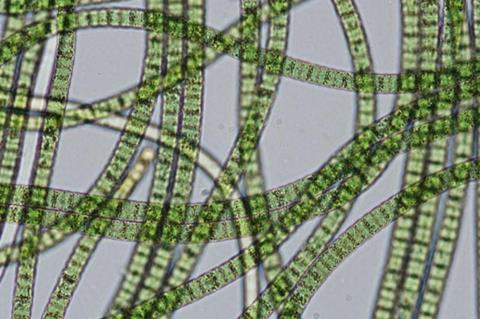Lumen Bioscience has been named as the inaugural winner of the $1.5 million Wilkes Center Climate Prize at the University of Utah. The Seattle-based biotech company beat 77 international teams with their proposal to drastically reduce methane emissions from dairy and beef cattle using a patented mixture of enzyme proteins.

William Anderegg, director of the U-based Wilkes Center for Climate Science & Policy, made the announcement at a press conference on Sept. 22, 2023, at the Natural History Museum of Utah.
The Wilkes Climate Prize at the University of Utah is one of the largest university-affiliated climate prizes in the world and aims to push through potential breakthroughs with a one-time, unrestricted cash award.
Supercharge ideas
“Lumen Bioscience has an audacious, creative goal to reduce methane emissions, a major contributor to climate change,” Anderegg said. “It’s perfect for the Wilkes Climate Prize—we want to supercharge a credible, ambitious idea that may be too risky for traditional funding sources. They’ve patented the technology and they’ve shown it works in the lab. Now, we want them to scale it up.”
Seven years ago, Lumen scientists discovered how to genetically engineer the edible algae spirulina, a problem that had vexed researchers for decades. Based on the discovery, they built a drug discovery and biomanufacturing platform mainly for developing new, orally delivered biogenic drugs against gastrointestinal (GI) targets that cause human disease.
Their winning Wilkes Climate Prize at the University of Utah project extends the approach to target the methane-producing microorganisms in the rumen, a specialized compartment of the cow’s GI tract.
Creative thinking
“Our award-winning proposal is a testament to the culture at Lumen, which encourages broad and creative thinking by our highly talented scientists,” said Jim Roberts, Lumen Bioscience chief scientific officer.
“CEO Brian Finrow and I founded Lumen on the idea that dramatically improving the cost and scalability of manufacturing protein therapeutics would allow us to address global challenges that are out of the reach of conventional biomanufacturing technologies. The recognition of the Wilkes Climate Prize at the University of Utah is a new and powerful example of this.”
Methane has 80 times more warming power over a 20-year timeframe than does carbon dioxide (CO2). Methane decays in the atmosphere faster than CO2, which means that cutting methane emissions will have a more immediate cooling effect.
Greenhouse gas
Methane from human activities - primarily agriculture - is behind at least 25% of today’s global warming, according to the Environmental Defense Fund, and livestock is the single largest agricultural source.
Microbes called methanogens in the cow rumen make methane as a by-product of digesting the grass and grains in their daily diet, stealing nutrients that would otherwise be available for the cow’s growth or milk production. This methane has no nutritional value to the cow - it’s a waste product they expel into the atmosphere by burping.
Nature itself has provided a solution for eliminating these methanogens using viruses that specialize in infecting the microbes. The viruses make an enzyme called lysin that cleaves apart the infected methanogen to release the progeny virus. The enzyme is exquisitely specific - it destroys only methanogens and has no effect on the cow itself or other bacteria that live in the rumen. It’s not absorbed into the cow’s system but is digested in the GI tract like any other protein.
Engineered spirulina
Lumen scientists engineered spirulina to biomanufacture this natural enzyme protein and showed that the spirulina-lysin destroys methanogens within minutes. The lysin-containing spirulina are so effective at killing methanogens that adding a tiny amount to the cow’s diet is enough to make them methanogen-free.
Lumen will use the Wilkes Climate Prize at the University of Utah to continue enhancing this enzyme cocktail, evaluate safety and efficacy in test cows, determine optimal dose size and dose frequency and validate the requisite large-scale outdoor production methods.
The program will initially live within a new division of Lumen Bioscience called Rumen Biotechnologies, which will likely be spun out within the next 12-18 months into a new standalone entity with a focused management team and investors.
Bold ideas
A panel of respected climate leaders reviewed 77 international proposals, looking for the boldest and most inspiring ideas to address the impacts of climate change.
“We urgently need to reduce emissions of methane since it is such a powerful contributor to climate change, but it has proven incredibly difficult to tackle in agricultural systems. Lumen’s novel solution is exciting and an ideal fit for a climate solutions prize like this one,” said Walt Reid, director of the Packard Foundation and member of the interdisciplinary Wilkes Climate Prize at the University of Utah judging panel.
The university hopes this successful debut of the Wilkes Center Climate Prize at the University of Utah will demonstrate how the competition can spur further innovation and climate change solutions in coming years. The $1.5 million prize was made possible through collective support from a cross-section of Utah-based organizations and industries. Whether the award amount next year can match, or even exceed $1.5 million again, will depend on yearly contributors.news







No comments yet